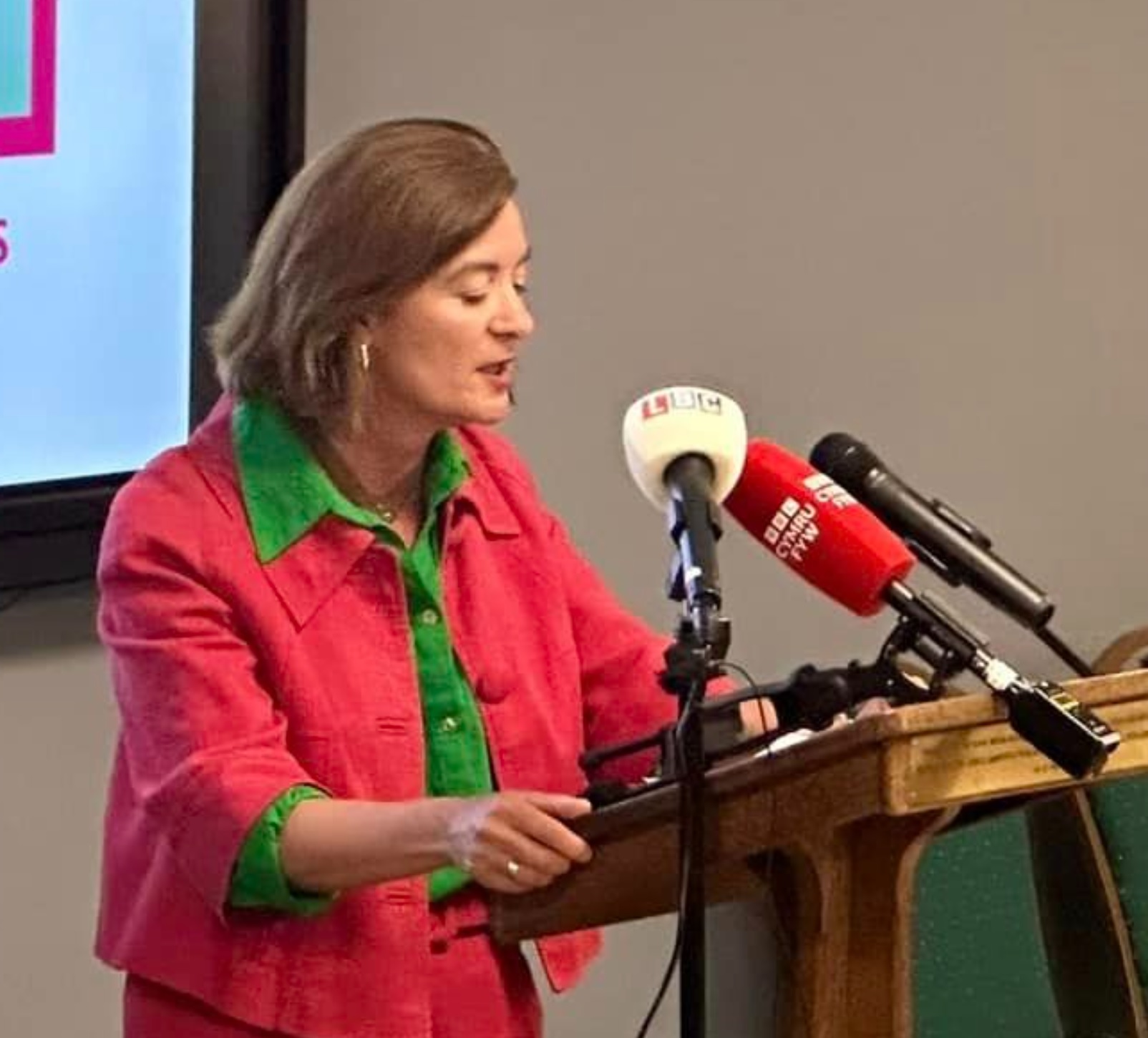Business
Bluestone to become UK’s first fossil fuel free family resort

PEMBROKESHIRE’S Bluestone National Park Resort is set to make history by becoming the UK’s first fossil fuel free luxury family holiday park in 2025.
The resort, located near Narberth, has unveiled ambitious operational plans to eliminate fossil fuels from all aspects of its operations. Bluestone will purchase only renewable electricity through its partnership with Ecotricity – widely recognised as Britain’s greenest energy provider – while replacing traditional fuels with sustainable alternatives. These include bioLPG in place of mains gas, and hydrotreated vegetable oil (HVO) instead of diesel and kerosene. Solar power generated by the resort’s on-site 3.2MW solar park already meets a third of its annual electricity demand.
Bluestone has long demonstrated a commitment to sustainable practices. In 2008, it became one of the first in the world to heat a water park – the Blue Lagoon – entirely without fossil fuels. Since then, the resort has continued to reduce its carbon footprint, and the completion of the solar park in 2024 marked a major milestone on its journey.
The resort’s approach extends beyond its own operations. Two external grounds maintenance contractors working on-site have also now transitioned to using electric machinery and HVO fuels in support of the wider sustainability mission.
In 2024, both Bluestone and Ecotricity received top-three rankings in their sectors by Which?, with Bluestone recognised as one of the UK’s best holiday resorts, and Ecotricity ranked among the leading eco energy providers.
The partnership supports Bluestone’s efforts to eliminate all fossil fuels across its scope one and two emissions – those generated directly by the resort and through purchased energy. The resort is also aiming to become entirely self-sufficient in renewable electricity generation within the next decade.
Marten Lewis, Bluestone’s Sustainability Director, said:
“Bluestone’s partnership with Ecotricity showcases there is another way forward. There’s a genuine synergy between our two companies, shaped by visionary founders who believed in putting people and the planet at the heart of business. In 2004, Bluestone’s founder, William McNamara, began the regenerative tourism movement here in Wales by transforming a 500-acre dairy farm into a pioneering, sustainable resort – a vision laid out in his original green book the same year the UN coined the term ESG.”
Mr Lewis added that Bluestone’s solar park project includes a long-term partnership with Swansea University to monitor biodiversity at the site, with the goal of producing influential academic research over the coming years.
“Bluestone doesn’t aim to have zero impact – we want to have a positive impact with everything we do,” he said.
Ecotricity founder Dale Vince said:
“Big congrats to Bluestone. From ditching intensive farming in favour of regenerative tourism to building a new solar park – this is a holiday park that fits with our values. I’m pleased Bluestone has chosen Ecotricity to provide the balance of green energy they need to go fossil free. We’re looking forward to helping them bring their green ambitions to life.”
More information about Bluestone’s sustainability journey and bookings can be found at: bluestonewales.com
Business
Bid to convert office space into chocolate factory, salon and laundrette

A CALL for the retrospective conversion of office space previously connected to a Pembrokeshire car hire business to a chocolate factory, a beauty salon and a laundrette has been submitted to county planners
In an application to Pembrokeshire County Council, Mr M Williams, through agent Preseli Planning Ltd, sought retrospective permission for the subdivision of an office on land off Scotchwell Cottage, Cartlett, Haverfordwest into three units forming a chocolate manufacturing, a beauty salon, and a launderette, along with associated works.
A supporting statement said planning history at the site saw a 2018 application for the refurbishment of an existing office building and a change of use from oil depot offices to a hire car office and car/van storage yard, approved back in 2019.
For the chocolate manufacturing by ‘Pembrokeshire Chocolate company,’ as part of the latest scheme it said: “The operation comprises of manufacturing of handmade bespoke flavoured chocolate bars. Historically there was an element of counter sales but this has now ceased. The business sales comprise of online orders and the delivery of produce to local stockist. There are no counter sales from the premises.”
It said the beauty salon “offers treatments, nail services and hairdressing,” operating “on an appointment only basis, with the hairdresser element also offering a mobile service”. It said the third unit of the building functions as a commercial laundrette and ironing services known as ‘West Coast Laundry,’ which “predominantly provides services to holiday cottages, hotels and care homes”.
The statement added: “Beyond the unchanged access the site has parking provision for at least 12 vehicles and a turning area. The building now forms three units which employ two persons per unit. The 12 parking spaces, therefore, provide sufficient provision for staff.
“In terms of visiting members of the public the beauty salon operates on an appointment only basis and based on its small scale can only accommodate two customers at any one time. Therefore, ample parking provision exists to visitors.
“With regard to the chocolate manufacturing and commercial laundrette service these enterprises do not attract visitors but do attract the dropping off laundry and delivery of associated inputs. Drop off and collections associated with the laundry services tend to fall in line with holiday accommodation changeover days, for example Tuesday drop off and collections on the Thursday.
“With regard to the chocolate manufacturing ingredients are delivered by couriers and movements associated with this is also estimated at 10 vehicular movements per week.”
The application will be considered by county planners at a later date.
Business
First Minister criticised after ‘Netflix’ comment on struggling high streets

Government announces 15% support package but campaigners say costs still crushing hospitality
PUBS, cafés and restaurants across Wales will receive extra business rates relief — but ministers are facing criticism after comments suggesting people staying home watching Netflix are partly to blame for struggling high streets.
The Welsh Government has announced a 15% business rates discount for around 4,400 hospitality businesses in 2026-27, backed by up to £8 million in funding.
Announcing the package, Welsh Government Finance Secretary Mark Drakeford said: “Pubs, restaurants, cafés, bars, and live music venues are at the heart of communities across Wales. We know they are facing real pressures, from rising costs to changing consumer habits.
“This additional support will help around 4,400 businesses as they adapt to these challenges.”
The announcement came hours after Eluned Morgan suggested in Senedd discussions that changing lifestyles — including more time spent at home on streaming services — were contributing to falling footfall in town centres.
The remarks prompted political backlash.
Leader of the Welsh Liberal Democrats, Jane Dodds, said: “People are not willingly choosing Netflix over the high street. They are being forced indoors because prices keep rising and wages are not.
“Blaming people for staying at home is an insult to business owners who are working longer hours just to survive.”
Industry groups say the problem runs deeper than consumer behaviour.
The Campaign for Real Ale (CAMRA) welcomed the discount but warned it would not prevent closures.
Chris Charters, CAMRA Wales director, said: “15% off for a year is only the start. It won’t fix the unfair business rates system our pubs are being crushed by.
“Welsh publicans need a permanent solution, or doors will continue to close.”
Across Pembrokeshire, traders have repeatedly told The Herald that rising energy bills, wage pressures and rates — rather than a lack of willingness to go out — are keeping customers away.
Several town centres have seen growing numbers of empty units over the past year, with independent shops and hospitality venues reporting reduced footfall outside the main tourist season.
While ministers say the relief balances support with tight public finances, business groups are calling for wider and longer-term reform.
Further debate on rates changes is expected later this year.

Business
Pub rate relief welcomed but closures still feared

CAMRA warns one-year discount is only a sticking plaster as many Welsh locals face rising bills
A BUSINESS rates discount for Welsh pubs has been welcomed as a step in the right direction — but campaigners warn it will not be enough to stop more locals from shutting their doors.
The Campaign for Real Ale (CAMRA) says the Welsh Government’s decision to offer a 15 per cent reduction on business rates bills for the coming year will provide short-term breathing space for struggling publicans.
However, it believes the move fails to tackle deeper problems in the rating system that continue to pile pressure on community pubs across Wales, including in Pembrokeshire and Carmarthenshire.
Chris Charters, Director of CAMRA Wales, said: “Today’s announcement from the Finance Secretary that pubs will get 15% discount on their business rates bills is a welcome step.
“However, many pubs still face big hikes in their bills due to the rates revaluation which could still lead to more of our locals in Wales being forced to close for good.
“15% off for a year is only the start of supporting pubs with business rates. It won’t fix the unfair business rates system our pubs are being crushed by.”
He added: “Welsh publicans need a permanent solution, or doors will continue to close and communities will be shut away from these essential social hubs that help tackle loneliness and isolation.”
Mounting pressure on locals
Under plans announced by the Welsh Government, pubs will receive a temporary discount on their rates bills for the next financial year.
But CAMRA argues that many premises are simultaneously facing sharp increases following the latest revaluation, which recalculates rateable values based on property size and trading potential.
For some smaller, rural venues, especially those already operating on tight margins, the increases could wipe out the benefit of the relief entirely.
Publicans say they are also contending with rising energy costs, higher wages, supplier price hikes and changing customer habits since the pandemic.
In west Wales, several long-standing village pubs have either reduced their opening hours or put their businesses on the market in the past year, with landlords warning that overheads are becoming unsustainable.
Community role
Campaigners stress that the issue goes beyond beer sales.
Pubs are often described as the last remaining social spaces in small communities — hosting charity events, sports teams, live music and local groups.
In parts of rural Pembrokeshire, a pub can be the only public meeting place left after the loss of shops, banks and post offices.
CAMRA says supermarkets and online retailers enjoy structural advantages that traditional pubs cannot match, making it harder for locals to compete on price.
The organisation is now calling on ministers to introduce a permanently lower business rates multiplier for pubs, rather than relying on short-term discounts.
Long-term reform call
CAMRA wants whoever forms the next Welsh administration to commit to fundamental reform of the rating system, arguing that pubs should be recognised as community assets rather than treated like large commercial premises.
Without change, it warns, the number of closures is likely to accelerate.
Charters said: “This is about protecting the future of our locals. Once a pub shuts, it rarely reopens. We can’t afford to lose any more.”
For many communities across west Wales, the fear is simple: temporary relief may buy time — but it may not be enough to save the local.
-

 Health6 days ago
Health6 days agoConsultation reveals lack of public trust in health board
-

 News1 day ago
News1 day agoPrincess of Wales visits historic Pembrokeshire woollen mill
-

 Crime5 days ago
Crime5 days agoPembroke man accused of child sex offences sent to Swansea Crown Court
-

 Community7 days ago
Community7 days agoCampaign to ‘save’ River Cleddau hits over 2,200 signatures
-

 Health3 days ago
Health3 days agoDoctor struck off after sexual misconduct findings at Withybush Hospital
-

 Health7 days ago
Health7 days agoAmbulance called after ‘drop of mouthwash’ swallowed as 999 abuse highlighted
-

 News7 days ago
News7 days agoWelsh Conservatives push for reversal of 20mph limit and major road spending
-

 Crime5 days ago
Crime5 days agoManhunt intensifies after woman seriously injured in Carmarthen park stabbing





























